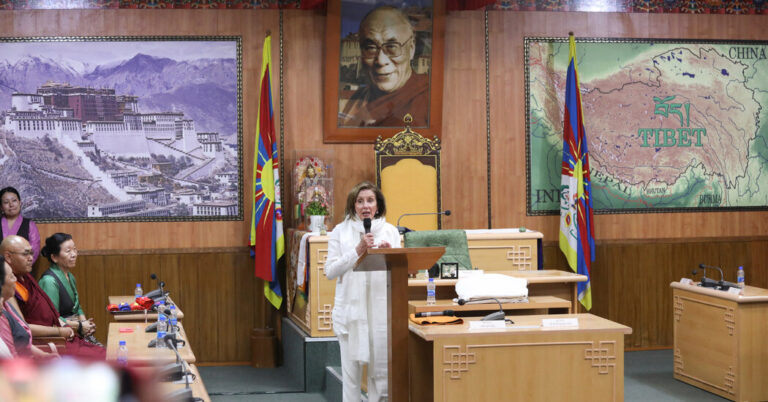A high-ranking delegation of US congressional officials, including former House Speaker Nancy Pelosi, visited the Dalai Lama at his home in India on Wednesday and met with him, a visit that had been condemned in advance by China, which considers the exiled Tibetan spiritual leader a separatist.
A delegation led by Michael McCaul, the Republican chairman of the House Foreign Affairs Committee, arrived Tuesday in Dharamsala, the Himalayan city where the Dalai Lama has lived since the 1960s. The delegation visited the offices of the Tibetan government-in-exile, which promotes autonomy for Tibet within China.
The visit came days after Congress passed a bill with bipartisan support calling on China to open dialogue with Tibetan leaders to find a solution to the long-running conflict.
China was quick to criticize the visit, which was not unexpected: Chinese leaders view the government-in-exile as illegitimate and any support for the Tibetan autonomy movement in what they call Xizang as interference in China’s internal affairs.
“We urge the US side to fully recognise the anti-China separatist nature of the Dalai Lama group, honour the commitments it has made to China on the Tibet issue, and stop sending wrong messages to the world,” the Chinese embassy in New Delhi said in a statement on Tuesday night.
U.S. officials meet frequently with the Dalai Lama, 88, but Pelosi’s presence with the delegation recalled her visit to Taiwan, claimed by China, in 2022 when she was House speaker.
The controversial visit raised concerns within the Biden administration that it would further worsen already frosty ties with China and prompted a harsh response from China, including trade restrictions on Taiwan and military drills near Taiwan’s waters.
The visit also comes as Washington and New York deepen ties in part due to a perceived shared threat from China. President Biden’s national security adviser, Jake Sullivan, visited New Delhi this week and has had multiple talks with Indian officials about expanding defense and technology cooperation.
These wide-ranging discussions, coming just weeks after Prime Minister Narendra Modi was elected to a third term in power, show how Washington is prioritizing ties with India, with U.S. officials increasingly speaking about India as a counterweight to Beijing.
Tenzin Lekshay, spokesman for the Central Tibetan Administration, the exile government, said the situation in Tibet should not be viewed through the lens of escalating conflict between the United States and China, but as a reminder that the Tibetan way of life “faces an existential threat” as China assimilates Tibet.
“We hope that leaders of the free world will stand up for the Tibetan cause and particularly urge the Chinese leadership to resume dialogue towards resolving the Sino-Tibetan conflict,” Lekshai said.

